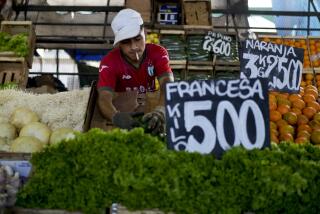International Business : Brazil’s Inflation Rate Surges to Nearly 45% : Latin America: Doubts about the finance minister’s economic stabilization plan grows on news that he may soon leave his post.
- Share via
RIO DE JANEIRO — With inflation surging toward a monthly rate of 45%, Finance Minister Fernando Henrique Cardoso has been trying to apply a stabilization plan that so far has brought hope, uncertainty--and more inflation.
Further uncertainty is being generated by Cardoso’s expected resignation to run in October presidential elections.
After meeting Tuesday with leaders of his party, who asked him to be its candidate, Cardoso left little doubt about his intentions. “If the party puts the victory banner in my hands, I am going to carry it,” he said.
President Itamar Franco has offered Cardoso’s post to Rubens Ricupero, 57, currently the minister of environment. A lawyer and career diplomat who has specialized in international trade, Ricupero previously served as Brazil’s ambassador to the United States.
Ricupero this week pointedly praised Cardoso’s anti-inflation plan. But some analysts fear that a change in ministers may complicate the plan’s implementation at a critical point. “The minister is acting like a mother who forgets her baby in the delivery room,” charged leftist candidate Luis Inacio Lula da Silva.
Others contend that by returning to his Senate seat while running for president, Cardoso could bolster the plan’s chances for continued political backing. His team of economists is expected to remain, including Central Bank chief Pedro Malan, who is a friend of Ricupero’s.
The plan’s key element is a new monetary measure called the “real value unit,” known as the URV. Roughly equal to a U.S. dollar, the URV provides a steady value for gauging inflation of the cruzeiro, Brazil’s currency.
The government has begun requiring that all salaries be calculated in URVs. It also is recommending that the URV be used for wholesale and retail pricing.
Authorities set new cruzeiro values for the URV daily. So the cruzeiro value of any item is its steady URV value times the URV’s cruzeiro value of the day.
Within two or three months, the government plans to make the URV the official currency, calling it the “real.” Government economists say the switch will suddenly stop inflation as everything’s steady URV value becomes its price in new currency.
But showing apparent uncertainty over how the currency changeover will work, many businesses have been marking up cruzeiro prices at a faster rate since the URV appeared at the beginning of March.
Some independent economists say it may be difficult for the government to calculate how much new money to circulate in the sudden switch from a rapidly inflating currency to a stable one. If the new money supply turns out to be much greater than needed, it could stimulate inflation, and if it is much smaller it could cause recession.
And many economists say that unless the government does more to eliminate major causes of inflation--such as deficit spending, official borrowing at high interest rates, and extravagant increases in the money supply--relief from “super-inflation” will be temporary at best. Since 1985, a series of stabilization plans have sometimes dramatically cut inflation, but it has always returned.
Franco, elected vice president in 1989, stepped into the presidency after Fernando Collor de Mello’s impeachment in 1992 on corruption charges. Cardoso, whose first job under Franco was foreign minister, has been finance minister since May, when inflation was running about 30% a month.
While Cardoso is a popular politician, he has been criticized for not taking action sooner against inflation. He announced his plan in December and, after delays getting congressional approval, began implementing it at the beginning of March. Some calculations put inflation during March at nearly 45%, or more than 8,500% a year.
Some analysts predict that if Cardoso’s plan succeeds in stopping inflation by October’s first round of elections, he will reap a winning harvest of votes. “When the second semester comes and inflation has dropped, he is going to rise politically,” said economist Salomao Quadros da Silva.
But Paulo Robelo de Castro, another economist, asked what credit voters will give Cardoso in view of the fact that inflation increased steadily during his tenure as finance minister. “What he did was what he did,” de Castro said.
More to Read
Sign up for Essential California
The most important California stories and recommendations in your inbox every morning.
You may occasionally receive promotional content from the Los Angeles Times.













